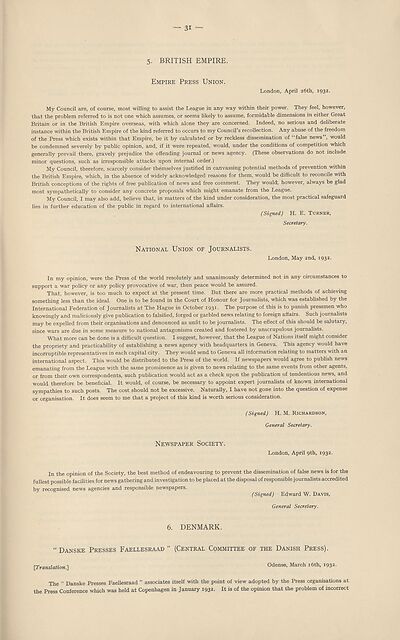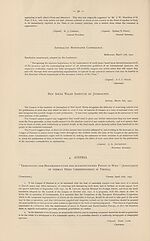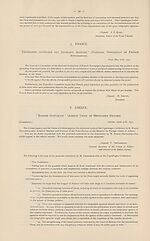Download files
Complete book:
Individual page:
Thumbnail gallery: Grid view | List view

— 3i
5. BRITISH EMPIRE.
Empire Press Union.
London, April 26th, 1932.
My Council are, of course, most willing to assist the League in any way within their power. They feel, however,
that the problem referred to is not one which assumes, or seems likely to assume, formidable dimensions in either Great
Britain or in the British Empire overseas, with which alone they are concerned. Indeed, no serious and deliberate
instance within the British Empire of the kind referred to occurs to my Council's recollection. Any abuse of the freedom
of the Press which exists within that Empire, be it by calculated or by reckless dissemination of “false news , would
be condemned severely by public opinion, and, if it were repeated, would, under the conditions of competition which
generally prevail there, gravely prejudice the offending journal or news agency. (These observations do not include
minor questions, such as irresponsible attacks upon internal order.)
My Council, therefore, scarcely consider themselves justified in canvassing potential methods of prevention within
the British Empire, which, in the absence of widely acknowledged reasons for them, would be difficult to reconcile with
British conceptions of the rights of free publication of news and free comment. They would, however, always be glad
most sympathetically to consider any concrete proposals which might emanate from the League.
My Council, I may also add, believe that, in matters of the kind under consideration, the most practical safeguard
lies in further education of the public in regard to international affairs.
(Signed) H. E. Turner,
Secretary.
National Union of Journalists.
London, May 2nd, 1932.
In my opinion, were the Press of the world resolutely and unanimously determined not in any circumstances to
support a war policy or any policy provocative of war, then peace would be assured.
That, however, is too much to expect at the present time. But there are more practical methods of achieving
something less than the ideal. One is to be found in the Court of Honour for Journalists, which was established by the
International Federation of Journalists at The Hague in October 1931. The purpose of this is to punish pressmen who
knowingly and maliciously give publication to falsified, forged or garbled news relating to foreign affairs. Such journalists
may be expelled from their organisations and denounced as unfit to be journalists. The effect of this should be salutary,
since wars are due in some measure to national antagonisms created and fostered by unscrupulous journalists.
What more can be done is a difficult question. I suggest, however, that the League of Nations itself might consider
the propriety and practicability of establishing a news agency with headquarters in Geneva. This agency would have
incorruptible representatives in each capital city. They would send to Geneva all information relating to matters with an
international aspect. This would be distributed to the Press of the world. If newspapers would agree to publish news
emanating from the League with the same prominence as is given to news relating to the same events from other agents,
or from their own correspondents, such publication would act as a check upon the publication of tendentious news, and
would therefore be beneficial. It would, of course, be necessary to appoint expert journalists of known international
sympathies to such posts. The cost should not be excessive. Naturally, I have not gone into the question of expense
or organisation. It does seem to me that a project of this kind is worth serious consideration.
(Signed) H. M. Richardson,
General Secretary.
Newspaper Society.
London, April 9th, 1932.
In the opinion of the Society, the best method of endeavouring to prevent the dissemination of false news is for the
fullest possible facilities for news gathering and investigation to be placed at the disposal of responsible journalists accredited
by recognised news agencies and responsible newspapers.
(Signed) Edward W. Davis,
General Secretary.
6. DENMARK.
“ Danske Presses Faellesraad
(Central Committee of the Danish Press).
^Translation^
Odense, March 16th, 1932.
The “ Danske Presses Faellesraad ” associates itself with the point of view adopted by the Press organisations at
the Press Conference which was held at Copenhagen in January 1932. It is of the opinion that the problem of incorrect
5. BRITISH EMPIRE.
Empire Press Union.
London, April 26th, 1932.
My Council are, of course, most willing to assist the League in any way within their power. They feel, however,
that the problem referred to is not one which assumes, or seems likely to assume, formidable dimensions in either Great
Britain or in the British Empire overseas, with which alone they are concerned. Indeed, no serious and deliberate
instance within the British Empire of the kind referred to occurs to my Council's recollection. Any abuse of the freedom
of the Press which exists within that Empire, be it by calculated or by reckless dissemination of “false news , would
be condemned severely by public opinion, and, if it were repeated, would, under the conditions of competition which
generally prevail there, gravely prejudice the offending journal or news agency. (These observations do not include
minor questions, such as irresponsible attacks upon internal order.)
My Council, therefore, scarcely consider themselves justified in canvassing potential methods of prevention within
the British Empire, which, in the absence of widely acknowledged reasons for them, would be difficult to reconcile with
British conceptions of the rights of free publication of news and free comment. They would, however, always be glad
most sympathetically to consider any concrete proposals which might emanate from the League.
My Council, I may also add, believe that, in matters of the kind under consideration, the most practical safeguard
lies in further education of the public in regard to international affairs.
(Signed) H. E. Turner,
Secretary.
National Union of Journalists.
London, May 2nd, 1932.
In my opinion, were the Press of the world resolutely and unanimously determined not in any circumstances to
support a war policy or any policy provocative of war, then peace would be assured.
That, however, is too much to expect at the present time. But there are more practical methods of achieving
something less than the ideal. One is to be found in the Court of Honour for Journalists, which was established by the
International Federation of Journalists at The Hague in October 1931. The purpose of this is to punish pressmen who
knowingly and maliciously give publication to falsified, forged or garbled news relating to foreign affairs. Such journalists
may be expelled from their organisations and denounced as unfit to be journalists. The effect of this should be salutary,
since wars are due in some measure to national antagonisms created and fostered by unscrupulous journalists.
What more can be done is a difficult question. I suggest, however, that the League of Nations itself might consider
the propriety and practicability of establishing a news agency with headquarters in Geneva. This agency would have
incorruptible representatives in each capital city. They would send to Geneva all information relating to matters with an
international aspect. This would be distributed to the Press of the world. If newspapers would agree to publish news
emanating from the League with the same prominence as is given to news relating to the same events from other agents,
or from their own correspondents, such publication would act as a check upon the publication of tendentious news, and
would therefore be beneficial. It would, of course, be necessary to appoint expert journalists of known international
sympathies to such posts. The cost should not be excessive. Naturally, I have not gone into the question of expense
or organisation. It does seem to me that a project of this kind is worth serious consideration.
(Signed) H. M. Richardson,
General Secretary.
Newspaper Society.
London, April 9th, 1932.
In the opinion of the Society, the best method of endeavouring to prevent the dissemination of false news is for the
fullest possible facilities for news gathering and investigation to be placed at the disposal of responsible journalists accredited
by recognised news agencies and responsible newspapers.
(Signed) Edward W. Davis,
General Secretary.
6. DENMARK.
“ Danske Presses Faellesraad
(Central Committee of the Danish Press).
^Translation^
Odense, March 16th, 1932.
The “ Danske Presses Faellesraad ” associates itself with the point of view adopted by the Press organisations at
the Press Conference which was held at Copenhagen in January 1932. It is of the opinion that the problem of incorrect
Set display mode to:
![]() Universal Viewer |
Universal Viewer | ![]() Mirador |
Large image | Transcription
Mirador |
Large image | Transcription
Images and transcriptions on this page, including medium image downloads, may be used under the Creative Commons Attribution 4.0 International Licence unless otherwise stated. ![]()
| League of Nations > Armament > Co-operation of the press in the organisation of peace > (31) |
|---|
| Permanent URL | https://digital.nls.uk/195356634 |
|---|
| Shelfmark | LN.IX |
|---|
| Description | Over 1,200 documents from the non-political organs of the League of Nations that dealt with health, disarmament, economic and financial matters for the duration of the League (1919-1945). Also online are statistical bulletins, essential facts, and an overview of the League by the first Secretary General, Sir Eric Drummond. These items are part of the Official Publications collection at the National Library of Scotland. |
|---|---|
| Additional NLS resources: |
|

